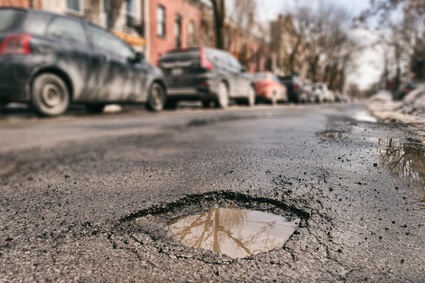Over the last few weeks some parts of the UK have experienced horrendous weather conditions with snow, wind and blizzard-like conditions. This has resulted in an array of serious accidents; people stuck on motorways for hours on end and general mayhem on the roads. The issue of potholes on roads is also a growing problem with the local councils under major budgetary pressure and often unable to carry out much-needed repairs. So what are the rules and regulations regarding accidents on snow-covered roads or damage to your vehicle as a consequence of potholes?
Acts Of Parliament
The Highways Act 1980 places a legal liability on local authorities to ensure the primary roads under their control are safe to use at all times. The UK Highways Agency takes on the responsibility of keeping motorways safe and passable so, depending on the type of claim, it may be your local council or the Highways Agency that is your eventual port of call.
Snow-Covered Roads
In order to fulfil their legal obligations, local councils and the Highways Agency use a number of methods to tackle the issue of dangerous roads. These include:
- Keeping sufficient salt and grit in stock
- Displaying relevant warning signs
- Having a set program in place for gritting and salting roads
- Closing roads which are deemed dangerous
- Keeping a check on local weather conditions
In some cases it can be very difficult to prove negligence on behalf of either the local council or the Highways Agency during abnormal weather conditions. The AA suggests that drivers should work on the basis that at least 40% of roads will be treated when snow and ice are forecast. Obviously, in circumstances where there is horrendous weather it is near possible for the relevant parties to clear every road and ensure they are all safe and passable. In legal terms the relevant authorities are only expected to “take reasonable steps to clear the roads” which is a potentially grey area that can make it a challenge to prove liability beyond all reasonable doubt.
Duty Of Care For Drivers
Recent examples of the duty of care for drivers in the UK occurred in Scotland, South West England, and Wales when “red weather warnings” were issued. This effectively means that drivers should only undertake journeys which are unavoidable and effectively do so at their own risk. So, while the relevant highway authorities have a duty of care to ensure roads are safe and sound at all times, drivers also have a duty of care for other road users and to abide by official warnings. Any claim for injuries could be negated if it was proved that the driver in question ignored official warnings or was driving in a manner which was not suitable for the road conditions.
Claiming Compensation For A Weather Related Accident
Where it can be proven that a road was not sufficiently gritted or cleared it may be possible to pursue a claim for injuries incurred. Once liability has been proven it is highly likely that the local council would look towards an out-of-court settlement to reduce potential legal fees. There is an indicative compensation table for different types of injuries but in reality these will vary to reflect the nature of a specific claim.
Car Damage As A Consequence Of Potholes
In years gone by pothole claims were very often waved through by the local authorities as it was cheaper to pay out on claims rather than defend them in the courts. We then saw a period during  which the majority of “borderline” pothole claims were pursued through the courts as a means of making an example of those looking to play the system. Unfortunately, as the road budget for both local authorities and the Highways Agency has been slashed over recent years, there is a fear we are now moving back towards a system which will via towards paying out on pothole claims rather than defending them.
which the majority of “borderline” pothole claims were pursued through the courts as a means of making an example of those looking to play the system. Unfortunately, as the road budget for both local authorities and the Highways Agency has been slashed over recent years, there is a fear we are now moving back towards a system which will via towards paying out on pothole claims rather than defending them.
Damage as a consequence of potholes in the road can cause anything from suspension damage through to a dangerous and potentially fatal crash. The recent bout of severe weather has exacerbated the problem of potholes because the extreme variation in temperature is the core reason for the creation of these holes in the road.
What To Do When Hitting A Pothole
The AA has published a very interesting guide on what to do when hitting a pothole and pursuing a personal injury/repair compensation claim. The guide includes action such as:
Checking for damage
- If you believe you have hit a pothole then you should pull over at the earliest opportunity to check your vehicle for any damage.
- Monitor your vehicle when driving over the next few days, pay particular attention to any vibrations, steering issues or if the car is pulling to one side. In the event that you experience any of these issues you should have your vehicle checked at a local garage.
Taking notes
- When safe to do so, take notes on the location of the pothole, revisit and take photographs and send these to the relevant highways agency.
- Ensure that any photographs include a familiar object to give an indication of scale.
Reporting the pothole
- It is only after a pothole is reported that the authorities can make the relevant repairs. So, whether or not you are looking to pursue a claim, you should report the location of potholes you come across.
- Potholes on motorway should be reported to the Highways division covering England, Scotland, Wales and Northern Ireland. Damage to non-motorway roads should be reported to the local authorities.
Repairing your vehicle
- Where your vehicle has been damaged it is advisable to gather more than one quote before carrying out any repairs.
- Keep a copy of all quotes and invoices which will be vital if you do pursue a compensation claim.
Making a claim
- Once you have gathered all of your evidence you should send this to the council/national agency looking after the road in question. This should include the amount of money you are seeking in compensation.
- Unfortunately, while many claims for the cost of repairs will be successful, there is a standard defence for the relevant highway authorities. If the pothole in question had not been reported, or not picked up under their regular road checks, then they may be able to avoid liability and any compensation payment.
Appealing against an unsuccessful claim
- If you believe your claim has been unfairly refused you can request formal details of the council’s road inspection and repair procedures. In some circumstances this can be used as a basis for a successful appeal.
- It might also be useful to request a report of council inspection dates for a particular road to see if it had been inspected in a timely manner.
The size of any compensation claim in regards to a pothole repair/injury will obviously depend upon the injuries incurred and the damage to your vehicle. Unfortunately, many people fail to stake a claim for repairs or injuries incurred as a consequence of potholes because they feel the system is stacked against them. However, there are personal injury claim companies with significant experience in this area who will be able to advise you accordingly. Please contact us if you require expert advice.
Conclusion
In summary, either the local council of the National Highways Agency have an obligation to ensure that roads under their jurisdiction are safe. In extreme weather conditions it may be impossible to cover all roads and even those treated may still have an above average element of danger when driving. There is a degree of common sense when it comes to claims for compensation as a consequence of snow/ice covered roads and potholes, and some claims which seem extremely strong on the surface may not be successful.




1 comment
Tony
I’ve just ruined two wheels on a massive pothole which will probably cost me at least £300 to put right! Plus the expense and time wasted having my car collected as I can’t drive it with two ruined wheels and flat tyres. Why do I pay my road tax again? Terrible roads, no police, people being detained for bogus reasons when trying to enter the country, political correctness gone mad, free speech being slowly but surely outlawed, the list goes on. And not to mention the pain in my poor back I’m getting now which I’ve just spoken to one of your solicitors about (very helpful thank you). Still the weather’s not bad so can’t complain.